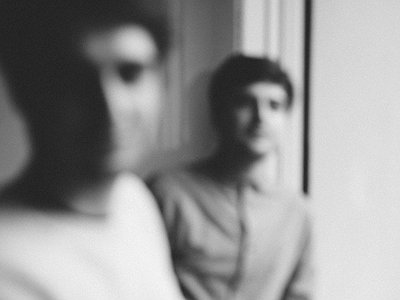Could you describe your creative process on the basis of a piece or album that's particularly dear to you, please? Where do ideas come from, what do you start with and how do you go about shaping these ideas?
T: For our album a lot of the material was actually drafted by either me or Francesco separately and then developed together. It can start with everything and anything and, as mentioned earlier, we like switching methods around to explore new ideas.
“Disquieting”, for example, started with me recording the main synth one night and Francesco playing the drums on top the next day. The track was eventually arranged and completed when we were both in the studio again that evening. For “tel://xn--19-924175-13294-ku9h”, Francesco laid down most of the music at home, while I added some drums and chords later once he brought the draft to the studio.
With more and more musicians creating than ever and more and more of these creations being released, what does this mean for you as an artist in terms of originality? What are some of the areas where you currently see the greatest potential for originality and who are some of the artists and communities that you find inspiring in this regard?
T: Originality has always been a big deal for us. If you don’t have something original to express, then there is little point in trying to. We never felt like we really belonged to a scene and hated all this “labelling” that was happening with some of our past efforts. The main issue is that once you’re branded as something, you’re also instantly associated with certain other artists, clubs and crowds. This helped us a lot in the beginning (as it really aids promoters find line-ups you fit well in) but shrugging these labels off is a challenge: for some people you’re forever that guy that made a deep house record or that guy with the fast arpeggio or whatever. I’m not sure who we should blame here but in a lot of popular music artists quickly go stale and monotone as soon as they gather some popularity, only occasionally shifting over to the next trend as soon when their wallet demands it. This is even more common in techno and house, unfortunately.
With this album we tried to prove that we don’t necessarily need to belong to one specific “movement” and we don’t care about being labelled this or that. Our main goal was to make a record hard to place into a specific scene. Simply put, we love all kinds of music and we want our music to reflect that: CW/A has and will always be two guys bringing all the different things they like into a live, club/festival setting.
With that said, originality is still abundant and there’s more fresh-sounding stuff than ever nowadays, it’s just sad it gets so little exposure compared to some other names. I look up to labels like TriAngle, Blackest Ever Black, L.I.E.S. and XL for trying new things.
How strictly do you separate improvising and composing?
F: Improvising has always been a key element in both our productions and live sets. Even when composing we rarely stick to definitive rules and like to get carried away by ideas as they come to us: this usually means a lot of trial and error, but with time we’ve learnt to understand what works for us (and what doesn’t) fairly quickly. We rarely sit down and think “we should make something like this”, it usually just starts with either a jam or a recording sketch one of us has come up with and we take it from there.
How do you see the relationship between sound, space and composition and what are some of your strategies and approaches of working with them?
T: Balance is very important when writing music, as is the relationship between these elements you mention. Space allows sounds to breathe, but in the case of our last LP we decided to let it breathe very little: the drums are always busy and synths are stacked on top of each other to fill the entire frequency spectrum most of the time; we wanted it to sound heavy and claustrophobic. It was refreshing and definitely a new approach for us, but we think it fit with the album’s message very well.
What's your perspective on the relationship between music and other forms of art – painting, video art and cinema, for example – and for you and your work, how does music relate to other senses than hearing alone?
F: We have been trying to combine our music with other forms of art for quite some time now but never really got round to achieving the end result we’re looking to achieve. That’s mainly why we still haven’t made that decisive step yet. We’re very happy with the artwork our friend and graphic designer for Parachute (Kero) has been coming up with as we feel it resembles the music to it’s best but we’re still looking to explore more and more of this association between music and other art forms. Music videos and live visuals at shows are the next form we want to concentrate on.
What's your view on the role and function of music as well as the (e.g. political/social/creative) tasks of artists today - and how do you try to meet these goals in your work?
F: Music, as most forms of art, has always had it’s controversial moments, with certain artists going against politics, race, gender or anything socially related. It has always been the voice of movements and their causes (whether good or bad), and it has always pushed barriers some people would have preferred not to be pushed. Music was, and is supposed to be used as a mean of communication whether it’s anger or joy and nobody should have the right to judge something by saying it’s right or wrong no matter what message lies behind. Musicians today have the exact same task as the artists that came before: communicate what they feel and let the listener interpret what they wrote to their liking.
Our way of meeting these goals is going about our music without worrying too much about critique and to keep things interesting for ourselves while allowing the listeners to interpret what they hear. We’re not concerned with what the technical evaluation of a writer that thinks he/she knows what he/she is writing about will be, as long as it’s a healthy message that’s coming across we will always be supportive of this process.





